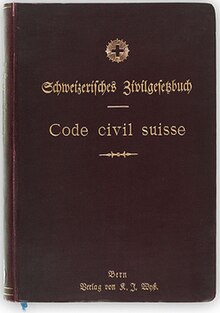Swiss Civil Code
| Swiss Civil Code | |
|---|---|
 The first edition of the Swiss Civil Code, circa 1907. | |
| Ratified | 1907 |
| Date effective | 1 January 1912 |
The Swiss Civil Code (SR 21, Template:Lang-de; Template:Lang-fr; Template:Lang-it; Template:Lang-rm) is the codified law ruling in Switzerland and regulating relationship between individuals. It was first adopted in 1907 (effective since 1 January 1912).[1][2]
It was largely influenced by the German civil code, and partly influenced by the French civil code, but the majority of comparative law scholars (such as K. Zweigert and Rodolfo Sacco) argue that the Swiss code derives from a distinct paradigm of civil law.[citation needed]
History and influences
Adopted on 10 December 1907 (and is thus formally known as the "Swiss civil code of 10 December 1907"), and in force since 1912. It was created by Eugen Huber, it was subsequently translated in the two other national languages (at the time Romansh was not official) by Virgile Rossel and Brenno Bertoni for French and Italian, respectively.
The civil code of the Republic of Turkey is a slightly modified version of the Swiss code, adopted in 1926 during Mustafa Kemal Atatürk's presidency as part of the government's progressive reforms and secularization. It also influenced the codes of several other states, such as Peru.[3]
In 1911, the Swiss Code of Obligations (SR 22)[4] was adopted and considered as fith part of the Swiss Civil Code. It thus became the first civil code to include commercial law.[5][6]
See also
Notes and references
- ^ "SR 21 Zivilgesetzbuch" (official website) (in German, French, and Italian). Berne, Switzerland. 10 September 1916. Retrieved 14 September 2016.
- ^ "Swiss Civil Code" (official website). Berne, Switzerland: Swiss Federal Council. 10 September 1916. Retrieved 14 September 2016.
- ^ "Swiss Civil Code". Encyclopedia Britannica, Inc. Retrieved 19 January 2009.
- ^ "SR 22 Obligationenrecht" (official website) (in German, French, and Italian). Berne, Switzerland. 10 September 1916. Retrieved 14 September 2016.
- ^ "SR 220 Federal Act on the Amendment of the Swiss Civil Code (Part Five: The Code of Obligations)" (official website). Berne, Switzerland: Swiss Federal Council. 10 September 1916. Retrieved 14 September 2016.
- ^ Frédéric Koller (13 September 2016). "Quand la Suisse inspire la modernisation du droit chinois". Le temps (in French). Lausanne, Switzerland. Retrieved 14 September 2016.
